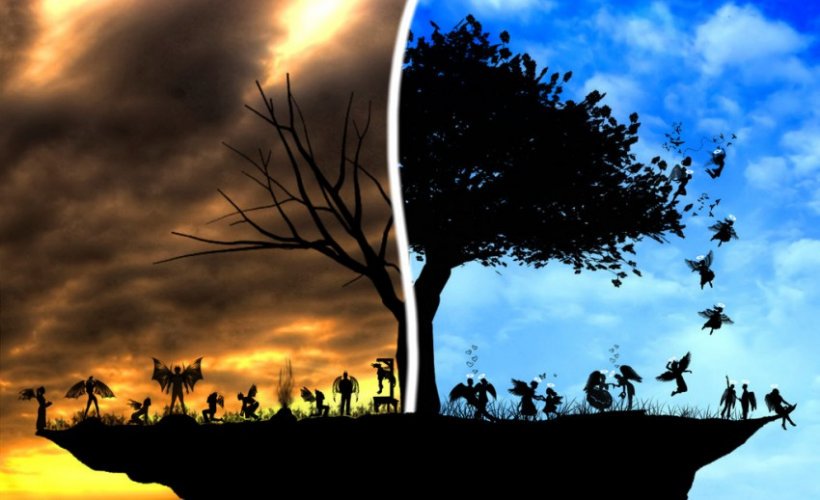Bani of SGGS Ji always fascinates us. It is always very refreshing. One is left astounded at the amazing vision and experiences of the Bhagats, the Gurus, the Sikhs and the Phatts whose Bani is in SGGS Ji. In Raag Bhairo, at Ang 1161, Bhagat Kabeer Ji has a charming Shabad. Bhagat Ji says..…

ਸਤਰਿ ਸੈਇ ਸਲਾਰ ਹੈ ਜਾ ਕੇ ॥
(He has 7,000 commanders,
ਸਵਾ ਲਾਖੁ ਪੈਕਾਬਰ ਤਾ ਕੇ ॥
and hundreds of thousands of prophets;
ਸੇਖ ਜੁ ਕਹੀਅਹਿ ਕੋਟਿ ਅਠਾਸੀ ॥
He is said to have 88,000,000 shaykhs,
ਛਪਨ ਕੋਟਿ ਜਾ ਕੇ ਖੇਲ ਖਾਸੀ ॥੧॥
and 56,000,000 attendants. ||1||)
Then the rahao di pangti says…
ਮੋ ਗਰੀਬ ਕੀ ਕੋ ਗੁਜਰਾਵੈ ॥
(I am meek and poor – what chance do I have of being heard there?)
ਮਜਲਸਿ ਦੂਰਿ ਮਹਲੁ ਕੋ ਪਾਵੈ ॥੧॥ ਰਹਾਉ ॥
(His Court is so far away; only a rare few attain the Mansion of His Presence. ||1||Pause||)
Bhagat Ji is speaking of the Muslim tradition and belief about Allah and the revelation to Prophet Muhammad by The Archangel Gabriel.
Islamic tradition holds that the Quran was revealed to Muhammad by the Archangel Gabriel over a period of 23 years. Gabriel is the chief of the angels and he is said to have 7000 angels who descended with him to make the revelation of the Quran to the Prophet of Islam.
So, when Bhagat Ji says “sattar sai salar hai ja kai” he means the Lord who is said to have 7,000 “salar”,i.e. commanders [angels]. This Shabad appears to be a response by Bhagat Ji to a conversation with a Muslim. Islam holds that the Quran was revealed by Gabriel from 610 A.D. to the time of Muhammad’s death in 632. A.D.
Muslim tradition further holds that this revelation was fixed in writing some time after Muhammad’s death by order of the Caliphs Umar and Abu Bakar.
Muslims regard the Quran as the culmination of a series of Divine messages that started with those revealed to Adam, regarded in Islam as the first Prophet. This continued with the “suhuf Ibrahim” or Scrolls of Abraham, the Torah, the Zabur, [book of psalms], and the Injil [the Christian Bible]. These books are not physically affixed within the Quran, but they are recognized therein.
The text of the Quran consists of 114 chapters of varying length known as sura. The SGGS Ji is structured according to Raags, the Gurus having given pre eminence to singing of Gods praises. The chapters of the Quran are classed as Mecca or Medina depending on where the verses were revealed.
Although there is some issue amongst scholars as to the number of “ayat” in the Quran , the most popular school says there are 6236 ayat therein. The SGGS Ji has close to 6000 Shabads of different lengths. The Quran did not exist in book form at the time of Muhammad’s death in 632. The Kartarpuri Bir was authenticated by Guru Arjun Dev Ji himself and “sudh kichay” and other internal evidence indicates the Guru himself supervised the final draft of the Bir known then as Pothi Sahib.
In Asa Ki Vaar we find the phrase
ਪੜਿਆ ਹੋਵੈ ਗੁਨਹਗਾਰੁ ਤਾ ਓਮੀ ਸਾਧੁ ਨ ਮਾਰੀਐ ॥-(Ang 469)
(If an educated person is a sinner, then the illiterate holy man is not to be punished).
The word “ummi” is of Arabic origin and is used for the Prophet of Islam and is interpreted to mean he was illiterate, thus reinforcing the fact that the revelation in the Quran must have originated from a Divine source.
Islamic tradition also holds that from the time of Adam till Muhammad, God had sent 125,000 Prophets in one form or other to the world to indicate the Lord’s glory, and Muhammad was the last Prophet. It is this that Bhagat Ji refers to, when he says “sava lakh paikambar hai ja kai”
In a similar vein, from the time of Adam to Muhammad, there were believed to be 88,000,000 Shaikhs and 56,000,000 attendants. With such a power packed impressive list of archangels, angels, prophets, shaikhs [i.e.spiritual leaders imbued with the Lord’s glory], and attendants waiting to do the Lord’s bidding, Bhagat Ji asks in a humble tone “what chance do I have of being heard or granted an audience there?”
ਮੋ ਗਰੀਬ ਕੀ ਕੋ ਗੁਜਰਾਵੈ ॥
(I am meek and poor – what chance do I have of being heard there?)
ਮਜਲਸਿ ਦੂਰਿ ਮਹਲੁ ਕੋ ਪਾਵੈ ॥੧॥ ਰਹਾਉ ॥
(His Court is so far away; only a rare few attain the Mansion of His Presence. ||1||Pause||)
According to Islamic belief, Allah is said to reside in the Seventh Sphere [heaven]. Thus His majlis [Court] is “duur” [far], and a rare one makes it to His mahal [mansion,palace]. Sikh teachings however say God is all-pervading throughout the universe.
Bhagat Ji goes on……
ਤੇਤੀਸ ਕਰੋੜੀ ਹੈ ਖੇਲ ਖਾਨਾ ॥
(He has 33,000,000 play-houses.)
ਚਉਰਾਸੀ ਲਖ ਫਿਰੈ ਦਿਵਾਨਾਂ ॥
(His beings wander insanely through 8.4 million incarnations).
ਬਾਬਾ ਆਦਮ ਕਉ ਕਿਛੁ ਨਦਰਿ ਦਿਖਾਈ ॥
(He bestowed His Grace on Adam, the father of mankind,
ਉਨਿ ਭੀ ਭਿਸਤਿ ਘਨੇਰੀ ਪਾਈ ॥੨॥
who then lived in paradise for a long time. ||2||)
After setting the scene about God and His powerful attendants, the Shabad continues about man and his condition in the world
ਦਿਲ ਖਲਹਲੁ ਜਾ ਕੈ ਜਰਦ ਰੂ ਬਾਨੀ ॥
(Pale are the faces of those whose hearts are disturbed).
ਛੋਡਿ ਕਤੇਬ ਕਰੈ ਸੈਤਾਨੀ ॥
(They have forsaken their Bible, and practice Satanic evil).
ਦੁਨੀਆ ਦੋਸੁ ਰੋਸੁ ਹੈ ਲੋਈ ॥
(One who blames the world, and is angry with people,
ਅਪਨਾ ਕੀਆ ਪਾਵੈ ਸੋਈ ॥੩॥
shall receive the fruits of his own actions. ||3||)
The final lines show the supplication of the great Bhagat
ਤੁਮ ਦਾਤੇ ਹਮ ਸਦਾ ਭਿਖਾਰੀ ॥
(You are the Great Giver, O Lord; I am forever a beggar at Your Door).
ਦੇਉ ਜਬਾਬੁ ਹੋਇ ਬਜਗਾਰੀ ॥
(If I were to deny You, then I would be a wretched sinner).
ਦਾਸੁ ਕਬੀਰੁ ਤੇਰੀ ਪਨਹ ਸਮਾਨਾਂ ॥
(Slave Kabeer has entered Your Shelter).
ਭਿਸਤੁ ਨਜੀਕਿ ਰਾਖੁ ਰਹਮਾਨਾ ॥੪॥੭॥੧੫॥
(Keep me near You, O Merciful Lord God – that is heaven for me. ||4||7||15||)
This is Bhagat Kabeer’s view of the Muslim heaven [firdaus], [bahist]. Being at the Lord’s portal is heaven enough for Bhagat Ji.
Guru Arjun Dev ji also expresses a similar sentiment when Guru Ji says on Ang 534
ਰਾਜੁ ਨ ਚਾਹਉ ਮੁਕਤਿ ਨ ਚਾਹਉ ਮਨਿ ਪ੍ਰੀਤਿ ਚਰਨ ਕਮਲਾਰੇ ॥
(I do not seek power, and I do not seek liberation. My mind is in love with Your Lotus Feet).
After giving his views about the Muslim heaven, in the next Shabad, Bhagat Ji talks of the Hindu heaven [baikunth].
ਸਭੁ ਕੋਈ ਚਲਨ ਕਹਤ ਹੈ ਊਹਾਂ ॥
(Everyone speaks of going there,
ਨਾ ਜਾਨਉ ਬੈਕੁੰਠੁ ਹੈ ਕਹਾਂ ॥੧॥ ਰਹਾਉ ॥
but I do not even know where heaven is. ||1||Pause||)
ਆਪ ਆਪ ਕਾ ਮਰਮੁ ਨ ਜਾਨਾਂ ॥
(One who does not even know the mystery of his own self,
ਬਾਤਨ ਹੀ ਬੈਕੁੰਠੁ ਬਖਾਨਾਂ ॥੧॥
speaks of heaven, but it is only talk. ||1||)
Bhagat Ji does not agree with this talk of heaven, whether it’s the Muslim bahist or Hindu baikunth. We should not aspire for any physical heaven after death. Our aspiration should be to dwell at the Lord’s Feet.
ਜਬ ਲਗੁ ਮਨ ਬੈਕੁੰਠ ਕੀ ਆਸ ॥
(As long as the mortal hopes for heaven,
ਤਬ ਲਗੁ ਨਾਹੀ ਚਰਨ ਨਿਵਾਸ ॥੨॥
he will not dwell at the Lord’s Feet. ||2||)
ਖਾਈ ਕੋਟੁ ਨ ਪਰਲ ਪਗਾਰਾ ॥
(Heaven is not a fort with moats and ramparts, and walls plastered with mud;
ਨਾ ਜਾਨਉ ਬੈਕੁੰਠ ਦੁਆਰਾ ॥੩॥
I do not know what heaven’s gate is like. ||3||)
Bhagat Ji then concludes by saying what constitutes heaven for him. This is the heaven the Sikhs should aspire for.
ਕਹਿ ਕਮੀਰ ਅਬ ਕਹੀਐ ਕਾਹਿ ॥
(Says Kabeer, now what more can I say?)
ਸਾਧਸੰਗਤਿ ਬੈਕੁੰਠੈ ਆਹਿ ॥੪॥੮॥੧੬॥
(The Saadh Sangat, the Company of the Holy, is heaven itself. ||4||8||16||)
We should ever be grateful to the Gurus and Bhagats for giving us such easy access to Paradise be it firdaus or baikunth. We should attend as much sadhsangat as possible. It is easily available at most Gurdwaras.
The Gurus and the Bhagats taught us that we do not have to wait for physical death and then hopefully obtain entry into heaven. For a Sikh, his heaven is being in sadh sangat.
Gurfateh
Manjeet Singh
Malaysia
March 6th, 2014


